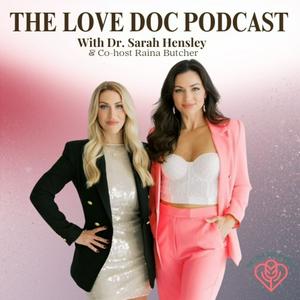In this episode of The Love Doc Podcast, Dr. Sarah Hensley and co-host Raina Butcher are joined by Rebecca Olson, a certified life coach specializing in working moms, mental health, and work–life balance. Together, they explore the psychological and emotional challenges that arise when women transition into motherhood while maintaining ambitious careers.
Through a psychology-based and relationship-focused lens, the conversation covers time management, identity shifts, attachment dynamics, boundaries, burnout, and redefining success during different seasons of life. Rebecca shares practical tools for protecting mental health, strengthening relationships, and reducing guilt and overwhelm—especially for high-achieving women navigating motherhood, partnership, and personal growth.
This episode is ideal for working moms, professionals, parents, and anyone interested in mental health, relationships, and personal development.
Be sure to check out Rebecca's services as well as Dr. Hensley's in the links below.
Bio
Rebecca is an international life coach and podcast host who helps career-focused parents stop feeling overwhelmed and "not enough" so they can be present with their kids while crushing their career goals. Through her coaching programs and podcast, Ambitious and Balanced Working Moms, Rebecca has helped thousands of parents learn to feel confident in who they are, what they want and the value they bring to their company and family. She teaches an inside- out approach to creating work-life balance that gives individuals 100% control over their time, energy and success. Rebecca is known for straight-talking and big earrings. She lives in the San Francisco Bay Area with her husband and two kiddos. When not coaching or speaking, she loves playing ultimate frisbee and drinks lots of tea.
LinkedIn: https://www.linkedin.com/in/rebolson/
Instagram: https://www.instagram.com/rebeccaolsoncoach
Website: https://www.rebeccaolsoncoaching.com/
Podcast: https://www.rebeccaolsoncoaching.com/podcast
Facebook: https://www.facebook.com/rebeccaolsoncoaching
Freebie
The Working Mom’s Daily Kickstart: A simple morning practice to stay ahead of stress and overwhelm – so you feel in control of your time, your mindset, and your priorities. https://www.ambitiousandbalanced.com/daily-kickstart
Tune in to The Love Doc Podcast every Tuesday morning for candid conversations, expert insights, and the guidance you need to navigate love and relationships in today’s world. For more information on Dr. Hensley’s offerings, explore the links below and connect with her on social media.
Patreon link: patreon.com/TheLoveDocPodcast
Dr. Hensley’s Hybrid Group Coaching: https://courses.thelovedoc.com/group-coaching
Book one on one with Dr. Hensley or one of her certified coaches: Virtual Coaching
Purchase Dr. Hensley’s online courses: https://courses.thelovedoc.com/courses
Tik-Tok: @drsarahhensley
Instagram: @dr.sarahhensley_lovedoc
Facebook: Dr. Sarah Hensley
Youtube: @Dr.SarahHensley
Disclaimer: The content shared on this podcast reflects personal experiences, opinions, and perspectives. The stories told are based on real-life events as remembered and interpreted by the hosts and guests. While we may discuss past relationships, custody matters, or personal dynamics, we do so from our point of view and with the intention of healing, education, and advocacy.
Identities are not disclosed unless already publicly known or permitted, and any resemblance to actual persons, living or dead, is purely coincidental unless explicitly stated. The information provided is not intended to defame, malign, or harm any individual or entity.
We do not offer legal advice or psychological diagnosis. Listeners are encouraged to consult with professionals regarding their specific circumstances.
By listening to this podcast, you agree that the hosts are not liable for any losses, damages, or misunderstandings arising from its content.
Become a supporter of this podcast: https://www.spreaker.com/podcast/the-love-doc-podcast--6390558/support.


